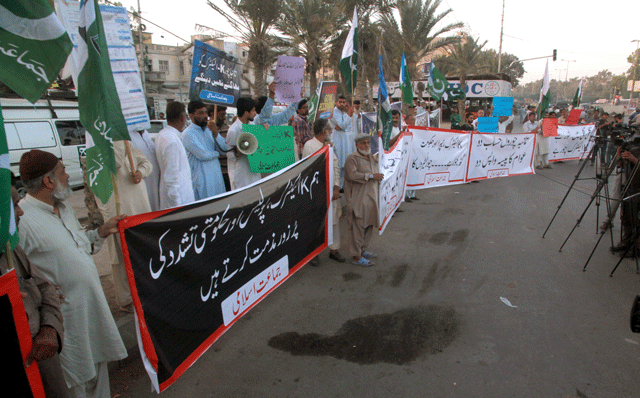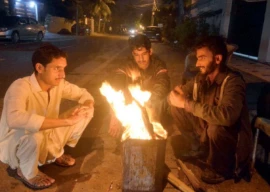
Female workers and supporters of the party joined the sit-in on Monday and brought bangles for party leaders. Leading the sit-in and protest, JI's Karachi chief Hafiz Naeemur Rehman said the country has many reservoirs and dams that can be used to produce energy at lower rates but incompetency and corruption of officials is causing people to face load-shedding.
"The number of facilities in the state are enough to end the energy crisis but officials do not want it to end," claimed Rehman, adding that Karachi has more energy than the city's actual demand.
JI stages sit-in against power bills in Karachi
K-E supplies 3,000 megawatts [MW] of energy but Karachi only consumes 2,200MW. "K-E is still left with 800MW of excess energy and they also take 650MW from the federal government," he said.
The JI leader also said that K-E's actual output is 2,093MW, while the National Transmission and Despatch Company [NTDC] provides 650MW and independent power producers [IPPs] provide it with 350MW of electricity, bringing the supplied amount to around 3,000MW.
"The K-E administration is imposing load-shedding, despite the fact that the production capacity of the company is more than the requirement," he said.
"Karachiites need almost 2,200MW, whereas K-E's production capacity and the electricity made available to the company by IPPs and the federal government is almost 3,093 MW," he said.
Rehman also alleged that K-E's administration is directly responsible for forcing citizens to go through load-shedding at a time of extreme heat.
No violence, just patience: JI stages sit-in against K-Electric
"The situation is a blatant and open violation of the National Electric Power Regulatory Authority [Nepra] rules," he said
The JI leader believed K-E was discriminating in load-shedding area-wise, which itself was a violation of rules. The Constitution as well as Nepra rules ensure that the federal government and power company will provide uninterrupted electricity to each and every consumer who pays their bills, he said.
Addressing the female participants of the rally, Rehman also pointed out that K-E does not even use 25 per cent of their own energy, which is why there is load-shedding. They also charge people for oil consumption while they use gas to produce energy, he said.
"They have made a slab system for payment of bills, according to Nepra, with different rates for peak hours, day and night, but the system is not implemented and bills continue to be on a one-rate system," said Rehman, labeling the act as 'white collar corruption'.





1732697578-0/Untitled-design-(5)1732697578-0-270x192.webp)











COMMENTS
Comments are moderated and generally will be posted if they are on-topic and not abusive.
For more information, please see our Comments FAQ